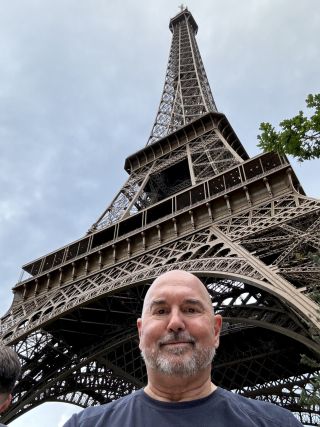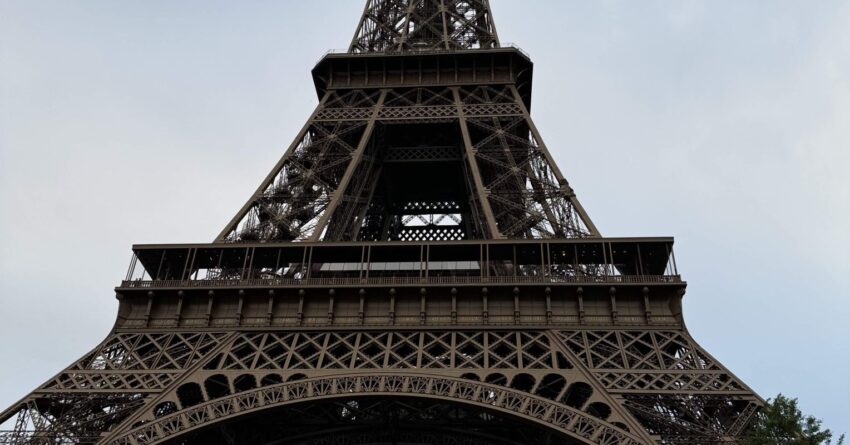Two recent exasperating experiences in a totally new city, both on the same day, underscored the fact that challenging experiences build our resilience when we look back on them and reframe their meaning and significance.
While we are in the midst of these experiences, we are more likely to feel whatever we feel—exasperation, anger, anxiety, fear. But putting them into perspective afterward is the act, and the work, of building resilience.
Here’s what happened.
I was visiting Paris for the first time. After landing at Charles De Gaulle Airport, I wheeled my carry-on suitcase and carried my backpack onto the RER B train from the airport to Gare de Nord, the big multimodal transportation station in the northern part of Paris.
From there, I changed to the Metro, aiming for Ivry-sur-Seine, the more modestly priced area just south of the city where I’d rented a tiny one-room apartment for the week. The property manager had told me the lock on the building’s front door was broken and would require a “sharp object” to open it. When I arrived at the building, someone was coming out and let me in. I was able to use the code given to me to open the lockbox and retrieve the keys.
Inside the apartment, I unpacked. That’s when I realized my wallet was missing. It had been inside my backpack, on my back, as I had ridden the sometimes crowded subway. There is a regular “Beware of pickpockets” announcement throughout the Metro system. It hadn’t occurred to me that pocket pickers can just as easily open a backpack as pick a pocket.
Fortunately, I had stored my passport, driver’s license, two credit cards, and 200 Euros elsewhere. So I wouldn’t be without money and essential IDs.
Still, it was an unnerving, exasperating, anxiety-provoking experience.
Meanwhile, I had pre-purchased a ticket for a guided tour up the Eiffel Tower that evening. I soared to the summit, took in the spectacular city, and snapped multiple photos of the City of Light, radiating outward like a star from this central point.

At the foot of the Eiffel Tower on my first day in Paris (May 25, 2024).
Source: John-ManuelAndriote/photo
Afterward, I made my way back to Ivry-sur-Seine. By then, it was after 11:00 p.m. I was exhausted after the eight-hour flight from Atlanta, the constant adrenaline rush from the newness and spectacle of a city long-imagined but totally unfamiliar, the frustration of the stolen wallet.
I wasn’t expecting to be locked out of the apartment building.
I called the property manager and booking.com. No one answered. What in the world should I do? I needed a place to sleep. Then I could (hopefully) deal with the situation in the morning.
All’s well that ends well enough
Fortunately I had enough juice in my cell phone and Googled “hotels near me.” I found one not too far away, and eventually found my way there. By then, I had walked more than eight miles that day. I was exhausted. The crisp white sheets of the twin-size bed were most welcome.
The next morning, I again called the property manager. She answered this time, and in her broken English and my broken French, we arranged to meet at the apartment building in an hour. There, she showed me the code for the outside door—an essential detail she had overlooked before my arrival.
Finally, armed with the code, knowing the next six nights would be spent in the apartment I had already paid for, I breathed a big sigh of relief and gratitude. I made up my mind not to let the stolen wallet or lock-out be “the” defining events of my week in Paris.
Of course, there are practical takeaway lessons from my unpleasant experiences in Paris, including not making a backpack susceptible to pickpockets by wearing it on my back in a crowded subway train and double-checking with a property manager to be sure I have the codes, etc. I need to successfully enter, lock, and leave an unfamiliar place where I’m staying.
But after that first unfortunate day, my week in Paris couldn’t have gone more smoothly. I navigated the Metro system all over the city, wasn’t late once for my pre-paid museum tours and a side trip to Versailles, and certainly ate a lot of wonderful food. I was flattered to be mistaken for a Frenchman because I have “the right” accent, I was told.
Resilience Essential Reads
C’est la vie!
My confidence was strong as I used my self-talk to keep myself going, walking vast distances each day, employing my French language ability to order morning croissants at the local boulangerie and ask for directions to a Metro station.
Altogether, I would call it a pretty wonderful trip.
The American couple I chatted with and told about these incidents while we were dining at adjacent tables in an outdoor café across the square from the Moulin Rouge, put it simply, in French: “C’est la vie!”
That’s life. Stuff happens. Sometimes quite unpleasant stuff. Even really hard stuff.
But life continues. And we go on. We do our best to avoid situations we know will not go well for us. But things happen anyway. A wallet is stolen. We’re locked out of a building. We can’t choose what happens or doesn’t happen to us.
We can choose how we will think about these challenges, what they will mean to us, whether they will continue to take up space in our mind and emotions and even spoil a trip to Paris—or not.
